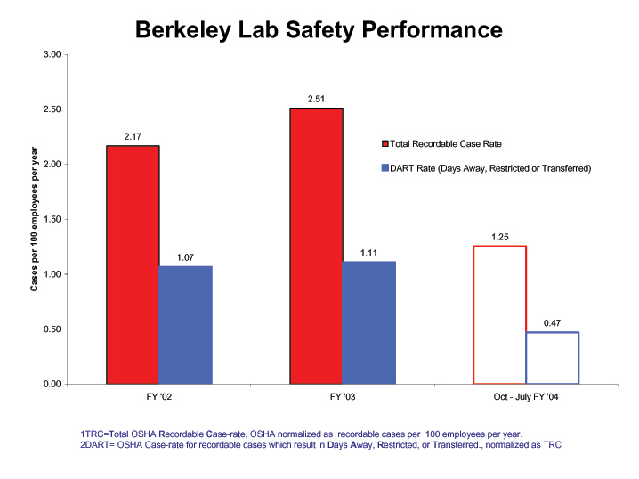Accident Prevention Urged for Final Weeks of Fiscal
Year '04
As the
fiscal year approaches its home stretch, the staff in Environment,
Health and Safety are working hard to ensure that the successes
of earlier this year will hold up, and accident numbers will
be lower than they've been in several years. That would mean
a positive score in the annual management assessment ratings
and, more importantly, a safe and healthy workforce.
But a
few unfortunate incidents in recent months have those injury
graphs inching upward, and EH&S has decided it's time
to reinforce the message about good safety practices and accident
prevention. When the Division did it the first time around,
last January in kicking off a lab-wide safety campaign, statistics
plummeted.
"The Lab
responded to the call," said Robin Wendt, Deputy Director
for EH&S.
"And we're
still doing well in accident prevention. But some of our early
gains are slipping. The Lab community needs to know that safety
is an ongoing responsibility. It has to be reinforced constantly."
It's a
high priority for the Office of Science, Wendt noted, but
more importantly, the health and vitality of the lab is at
stake. The final month of this fiscal year is especially important,
he said, because people are returning from vacation, students
are arriving -- some with little safety training - and Facilities
is at peak activity with year-end projects.
He noted
two particular areas for employees to consider: what is common
sense, and what their bodies tell them. "Some accidents are
difficult to prevent," Wendt said. "But simple caution is
sometimes all that's needed to avoid one. If someone has back
pain, should he try to lift something and aggravate it? Or,
if a worker experiences aches and pains, are they common to
aging or the result of ergonomic factors? These things should
be discussed with a supervisor and, if necessary, checked
out at Health Services."
Awareness
pays off. Since this year's heightened attention to laboratory
safety, accident rates have plummeted. As of July, the fiscal
'04 rate of accident cases per 100 employees was 1.25. This
compares favorably with the '02 (2.17) and '03 (2.51) rates.
Another measure is the DART rate - incident rates involving
employee days away from work, restricted or transferred. This
year's number is 0.47 per 100 employees; in '02 it was 1.07,
and in '03 it was 1.11.
With just
over 30 days to go in FY2004, Wendt is helping the Lab strive
for an accident-free Olympic-style dash to the finish line,
on the way to a Safety Gold.

Back to
"Today at Berkeley Lab"

|

